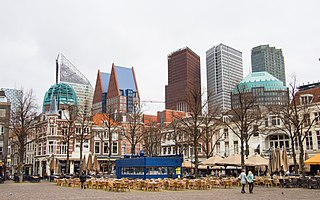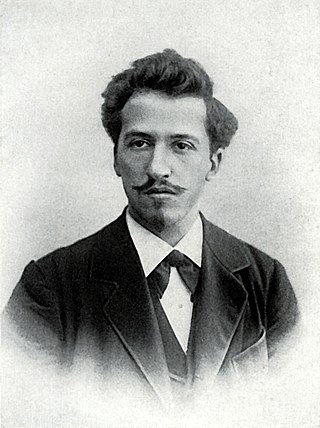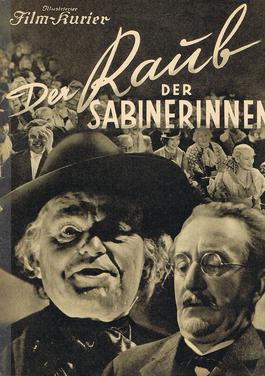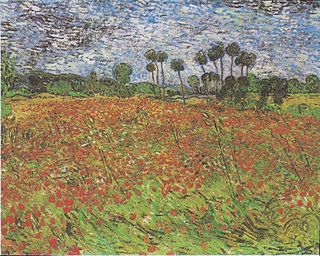
The Hague or Den Haag is the capital city of the South Holland province of the Netherlands. With a population of over half a million, it is the third-largest city in the Netherlands. Situated on the west coast facing the North Sea, The Hague is the country's administrative centre and its seat of government, and while the official capital of the Netherlands is Amsterdam, The Hague has been described as the country's de facto capital since the time of the Dutch Republic.

Carl Paul Jennewein was a German-born American sculptor.

The East Side Gallery memorial in Berlin-Friedrichshain is a permanent open-air gallery on the longest surviving section of the Berlin Wall in Mühlenstraße between the Berlin Ostbahnhof and the Oberbaumbrücke along the Spree. It consists of a series of murals painted directly on a 1,316 m (4,318 ft) long remnant of the Berlin Wall, located near the centre of Berlin, on Mühlenstraße in Friedrichshain-Kreuzberg.

Lee Bontecou was an American sculptor and printmaker and a pioneer figure in the New York art world. She kept her work consistently in a recognizable style, and received broad recognition in the 1960s. Bontecou made abstract sculptures in the 1960s and 1970s and created vacuum-formed plastic fish, plants, and flower forms in the 1970s. Rich, organic shapes and powerful energy appear in her drawings, prints, and sculptures. Her work has been shown and collected in many major museums in the United States and in Europe.

The Hague School is a group of artists who lived and worked in The Hague between 1860 and 1890. Their work was heavily influenced by the realist painters of the French Barbizon school. The painters of the Hague school generally made use of relatively somber colors, which is why the Hague School is sometimes called the Gray School.

The Kunstmuseum Den Haag is an art museum in The Hague in the Netherlands, founded in 1866 as the Museum voor Moderne Kunst. Later, until 1998, it was known as Haags Gemeentemuseum, and until the end of September 2019 as Gemeentemuseum Den Haag. It has a collection of around 165,000 works, over many different forms of art. In particular, the Kunstmuseum is renowned for its large Mondrian collection, the largest in the world. Mondrian's last work, Victory Boogie-Woogie, is on display at the museum.

The Vienna Volksoper is an opera house in Vienna, Austria. It produces three hundred performances of twenty-five German language productions of opera, operetta, musicals, and ballet, during an annual season which runs from September through June.

The Städel, officially the Städelsches Kunstinstitut und Städtische Galerie, is an art museum in Frankfurt, with one of the most important collections in Germany. The museum is located at the Museumsufer on the Sachsenhausen bank of the River Main. The Städel Museum owns 3,100 paintings, 660 sculptures, more than 4,600 photographs and more than 100,000 drawings and prints. It has around 7,000 m2 (75,000 sq ft) of display and a library of 115,000 books.

Pieter Cornelis Mondriaan, known after 1906 as Piet Mondrian, was a Dutch painter and art theoretician who is regarded as one of the greatest artists of the 20th century. He was one of the pioneers of 20th-century abstract art, as he changed his artistic direction from figurative painting to an increasingly abstract style, until he reached a point where his artistic vocabulary was reduced to simple geometric elements.

The Kunsthaus Zürich is in terms of area the biggest art museum of Switzerland and houses one of the most important art collections in Switzerland, assembled over time by the local art association called Zürcher Kunstgesellschaft. The collection spans from the Middle Ages to contemporary art, with an emphasis on Swiss art.

Neues Museum Nürnberg (NMN) is a museum for modern and contemporary art and design in Nuremberg.
Herbert Haag was a Swiss Roman Catholic theologian and biblical scholar of German origin.
Sabine Timoteo is a Swiss actress from the Lorraine district of Bern. She has appeared in more than thirty films since 2000.
Lotte de Beer is a Dutch opera director and administrator.

The Abduction of the Sabine Women is a 1936 German comedy film directed by Robert A. Stemmle and starring Bernhard Wildenhain, Max Gülstorff, and Maria Koppenhöfer. It was based on a play which has been adapted into films several times. It was shot at the Carl Froelich's Berlin Studios located in Tempelhof. The film's sets were designed by the art directors Walter Haag and Franz Schroedter.

Sabine Kunst is a German engineer, academic and politician who has been serving as chairwoman of the Joachim Herz Foundation since 2022.
Sabine Marcelis is a Dutch artist and designer. She has worked with brands and companies such as Audi, Céline, IKEA, Isabel Marant, Stella McCartney, and Renault. Her style typically includes pastel colours, minimalist shapes, and materials such as resin and glass, while her work focuses on themes of transparency, reflection, and translucency. She has described her work as “an investigation of light, how it can create effects and atmospheres."
Robert Strawbridge Grosvenor is an American contemporary sculptor, installation artist, and draftsman. He is known for his monumental room installations, which border between sculpture and architecture. Grosvenor is associated with minimalism.

The Aargauer Kunsthaus is a Swiss art museum founded in 1959, and located in Aarau. The museum collection includes Swiss art from the 18th century to the present day; and Naturama, a natural history collection.

Poppy Field is an 1890 painting by the Dutch artist Vincent van Gogh, painted around a month before his death during his stay in Auvers-sur-Oise, France. It has been described as "a composition that verges on the abstract" and shows marked difference from a 1888 painting of the same subject that now is in the Van Gogh Museum, in Amsterdam. Spending many years in Germany, the painting now hangs in the Kunstmuseum, in The Hague.















